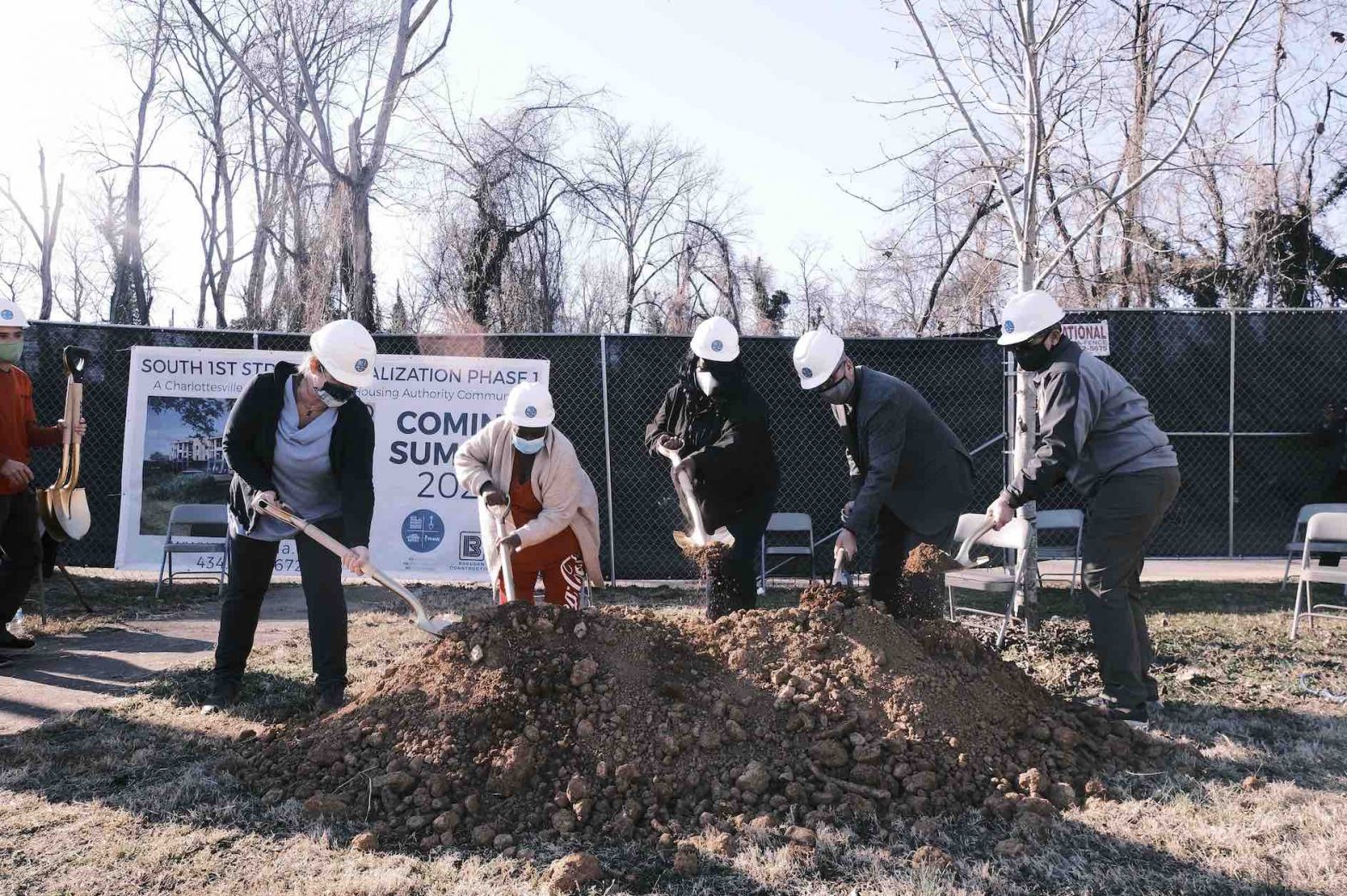“For more than 25 years, redevelopment and public housing in the City of Charlottesville have been conversations and promises to residents,” said Audrey Oliver, standing on a dirt lot near Oakwood Cemetery downtown. “The promises became broken, and residents became discouraged, because the promises were never delivered.”
That string of broken promises will soon be interrupted. Oliver, a public housing resident, was one of the planners who helped design what will become the South First Street public housing complex. On Sunday, Oliver and others gathered at the site of the development to break ground on the 175-plus-unit project.
“I want us all to remember that what we are doing today will last longer than any of us will be alive,” said Shelby Marie Edwards, the executive director of Charlottesville’s Public Housing Association of Residents, at the ceremony. “The only thing we know for sure is that we’re going to die, so what are we going to do with our lives while we have it? Are we going to build systems? Are we going to break down systems? Are we going to do both?”
For Edwards, the moment held particular weight. Her mother, Holly Edwards, was Charlottesville’s vice mayor and a PHAR program coordinator who pushed for reinvestment in public housing throughout her career. Sunday would have been Holly Edwards’ 62nd birthday.
Mayor Nikuyah Walker, Delegate Sally Hudson, and PHAR board of directors chair Joy Johnson were among the ceremony attendees, joined by several South First Street residents who played an instrumental role in designing the redevelopment.
During this first phase, three new apartment buildings will be constructed on the vacant land at the intersection of South First Street at Hartmans Mill Road. They will contain 63 one-, two-, and three-bedroom units, featuring dishwashers, laundry machines, high-speed internet, and other requested amenities. Solar panels will be installed on top of each building.
The first phase will cost an estimated $13 million, and is expected to be completed by spring 2022. In phase two, set to begin next year, 58 existing public housing units will be demolished and replaced with 113 multi-family units, including townhouses and apartments with one to five bedrooms.
The brand-new site will feature a community center, basketball court, play areas, and office space. It will be backed by low-income tax credits, city and state funds, and philanthropy.
After destroying Black neighborhoods like Vinegar Hill during urban renewal, Charlottesville built its first public housing sites for displaced residents in the 1960s.
“There was no intention behind the building of these spaces that honored people and their families,” said Walker during the ceremony. “Oftentimes we want to blame the individuals for not being able to persevere out of an environment that was built and intended to destroy them. If you walk into some of these units, you see cinder block walls and floors.”
“Today we understand that not just some people, but all people deserve to have homes that they can feel and see the love in,” she added. “That’s what we’ve been attempting to do with this redevelopment.”
According to Edwards, attempts to revitalize public housing go as far back as 2009, but have consistently failed to get off the ground. In 2016, PHAR finally got the ball rolling when it released a vision statement, providing insight on residents’ priorities and desire to spearhead the redevelopment process.
Today we understand that not just some people, but all people deserve to have homes that they can feel and see the love in.
Mayor Nikuyah Walker
From 2019 to 2020, a dozen South First Street residents met with architects on a weekly basis. After receiving training on land use and site planning, they helped to design all aspects of the second redevelopment phase.
“Not only did [the residents] present at City Council [and] the Planning Commission, but they presented at the governor’s conference and did an awesome job,” said Johnson. “To say that public housing or low-income residents don’t know what kind of community they want to build—they proved them wrong.”
Hudson emphasized the need for similar resident-led housing projects not just in Charlottesville, but nationwide.
“Across the country we are seeing more communities prioritize their public housing…instead of putting community leaders in the driver seat,” she said. “This is one of those places where Charlottesville is really being a leader nationally.”
Once the new apartments are constructed, current South First Street residents will have the option to move in, transfer to another public housing site, or receive a housing voucher before redevelopment continues in summer 2022.
The final phase of redevelopment is still in the works, but it will involve the land across the street from the original units.
All three phases are expected to cost a combined total of $38 million, and be completed by the end of 2024.
In the meantime, resident planner workshops and meetings will continue throughout this year and next year, allowing even more residents to have a say in the future of their community.
“There’s still lots of work that needs to be done to get all of our families new homes,” said Oliver. “Let’s work together and make it happen.”
